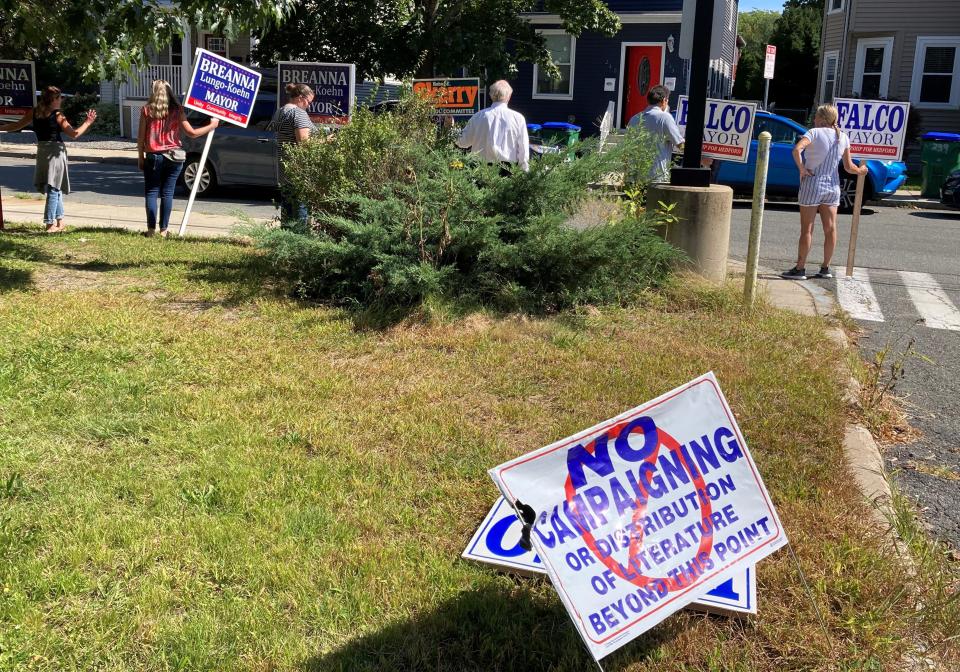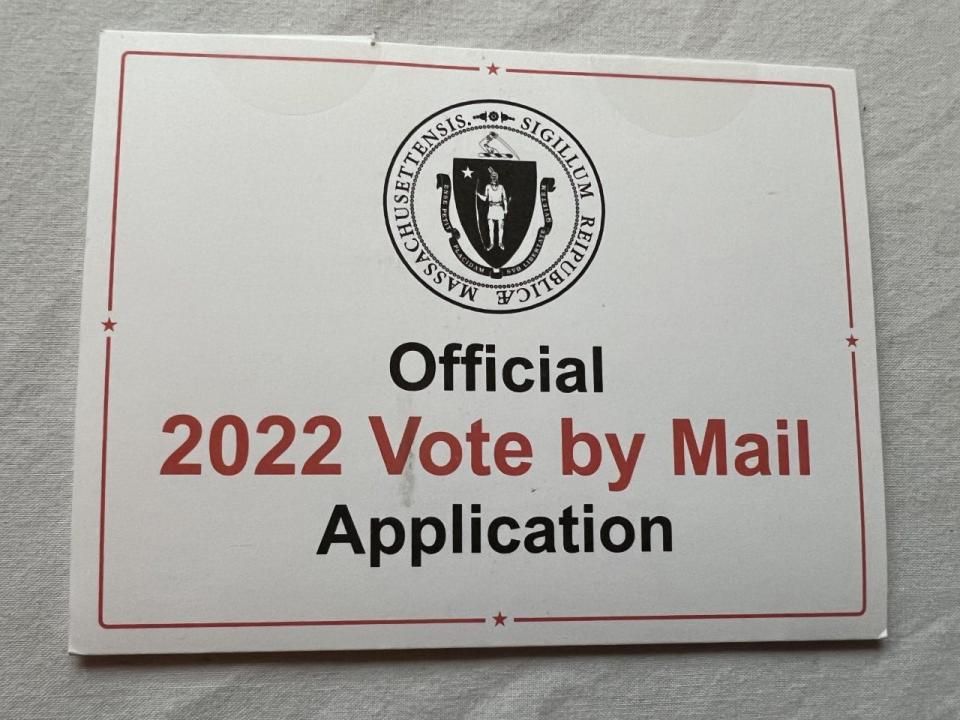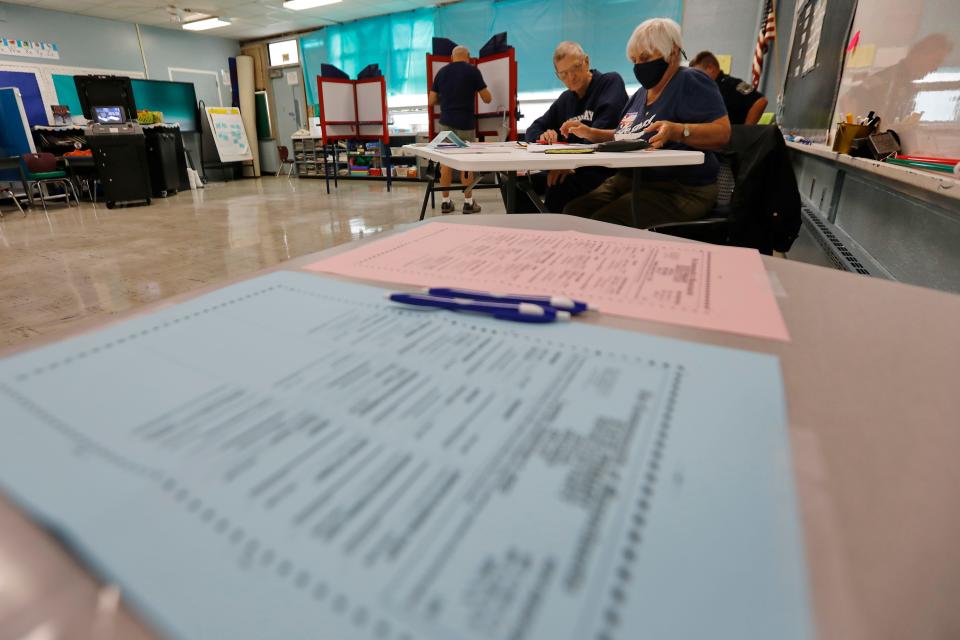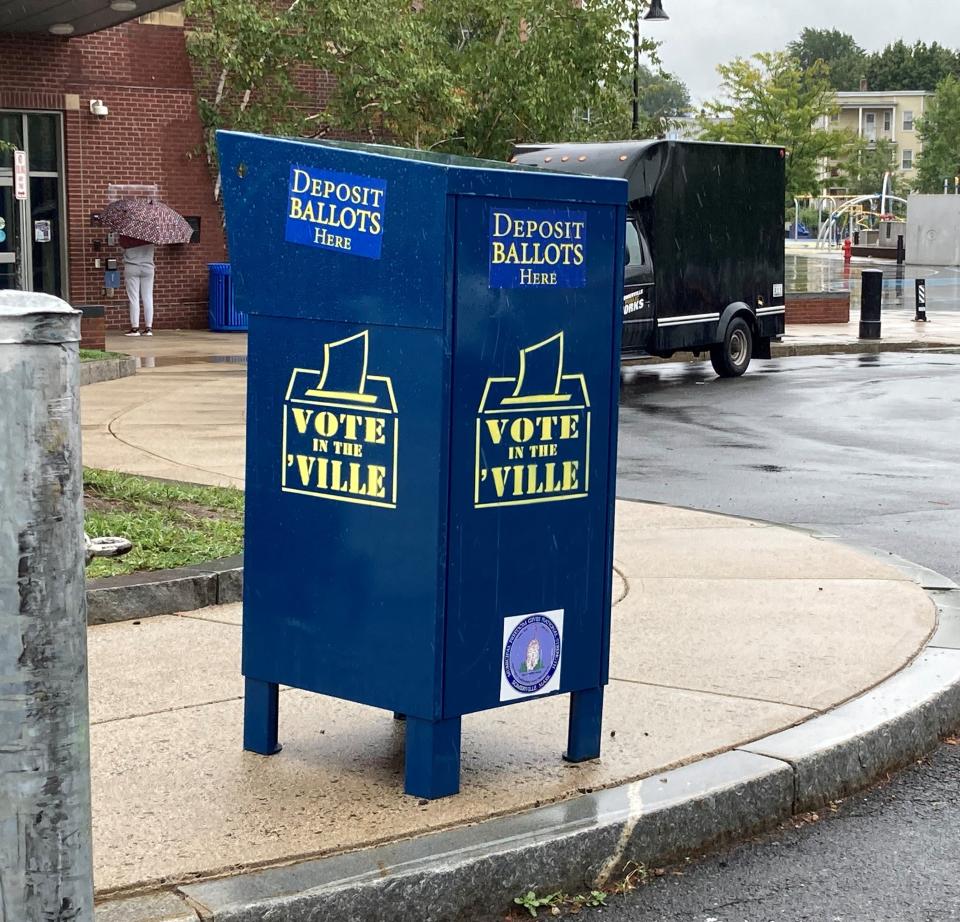What's on my Massachusetts ballot? Here's what you need to know plus early voting info
Leaves are turning color, apple cider doughnuts are everywhere, and there’s a debate over when to turn on the heat: Does one fire up the boiler on the first chilly morning or tough it out like good New Englanders and wait for November?
It’s that time of year: Voting season. The booklets issued by the secretary of state have been hitting voters' mailboxes over the last two weeks.
Maura T. Healey, a Democrat whose running mate is Salem Mayor Kimberley Driscoll, is favored in the polls to become the first woman elected governor of the state. (Republican Jane Swift rose from lieutenant governor to governor in April 2001, when Paul Cellucci was named ambassador to Canada.)
Who is running for office in Massachusetts in 2022?
Running for constitutional offices are:
Republicans: Geoff Diehl (governor), Leah Allen (lieutenant governor), James McMahon (attorney general), Rayla Campbell (secretary of state) and Anthony Amore (auditor). There is no Republican candidate for state treasurer.
Democrats: Healey (governor), Driscoll (lieutenant governor), Andrea Campbell (attorney general), William Galvin (secretary of state), Deborah Goldberg (treasurer) and Diana DiZoglio (auditor).

Other: Candidates representing other parties include Kevin Reed of the Libertarian Party, for governor; Peter Everett of the Libertarian Party, for lieutenant governor; Cristina Crawford of the Libertarian Party, for treasurer; Juan Sanchez of the Green-Rainbow Party, for secretary of state; and Gloria Caballero-Roca of the Green-Rainbow Party of Massachusetts, Daniel Riek of the Libertarian Party and Dominic Giannone III of the Workers Party, for auditor.
A guide to voter rights in Massachusetts: What you need to know before you cast a ballot
It may be the year of the woman
If the electorate splits the vote, Massachusetts could have an all-female leadership team in the six constitutional offices: Governor, lieutenant governor, attorney general, secretary of state, treasurer and auditor.
An all-female team could look like this:
Governor: Healey (Democrat)
Lt. governor: Driscoll (Democrat) or Allen (Republican)
Attorney general: Andrea Campbell (Democrat)
Secretary of state: Rayla Campbell (Republican)
Treasurer: Goldberg (Democrat)
Auditor: DiZoglio (Democrat)
Election 2022: Massachusetts voters give nods to 6 women of both parties in primaries. It's monumental
Why am I getting a ballot in the mail?
Sample ballots are being mailed out throughout the state. More than one million registered voters have requested mail-in ballots.
Important dates for early voting in Massachusetts
Oct. 17: Early voting schedules announced by municipalities
Oct. 22: Early in-person voting starts
Deadline to register to vote in Massachusetts
Oct. 29: Last day to register to vote
The deadline to register to vote was pushed back this summer by 10 days when legislators passed the VOTES Act. In the past, registration had traditionally closed 20 days before Election Day.
2022 Election: Massachusetts legislature passes bill allowing mail-in voting, 2 weeks of early voting
Registered voters still have time to request a mail-in ballot: By mail, e-mail, fax, online on the secretary of state website or by visiting their local elections office (usually located in city or town hall).

How can I vote early: In person, by mail
Ballots can be mailed through the U.S. Postal Service, or, if it’s just a few days before Nov. 8, can be dropped off at the local elections office or put into special drop boxes placed by communities.
Other registered voters who don't want to wait for Election Day can start lining up at early voting locations to cast their ballots on Oct. 22.
Times and locations for early voting vary in each municipality; the number of hours offered by each hinges on the number of registered voters in each community. Early voting times must include hours on at least two weekends.
In addition to choosing candidates, voters statewide are being asked to respond to four questions.

What type of questions are MA voters asked on a ballot
“There are four statewide questions,” said Deb O’Malley, a spokeswoman for the secretary of state. This year, Question 1 was included as a legislative initiative; the three other ballot questions were included by voter petition.
Common municipal ballot questions ask taxpayers to authorize an override of Proposition 2½. A yes on this question would allow a municipality to exceed the state cap on tax levy increases.
Another common municipal question asks whether residents want to participate in the Community Preservation Act, by implementing a property tax surcharge to preserve open and historic spaces, create affordable housing and develop outdoor recreation.
Nonbinding referendum questions, vetted by the attorney general's office for language issues, are listed after local municipal questions.
Here's who will be asked to vote on Proposition 2 1/2 questions and Community Preservation Act questions
Ten communities – Belmont, Brookline, Dudley, Hingham, Holden, Oak Bluffs, Orange, Rehoboth, Wenham and Westport – are asking voters to override Proposition 2½ to fund structures from schools to fire stations, ice rinks to public safety complexes and libraries.
Boylston, Burlington, Natick, Shelbourne, Westborough and Worcester are asking voters whether to participate in the Community Preservation Act.
Agawam is asking voters whether the mayoral term should be extended from two to four years.
Tisbury is asking the electorate whether it approves of changes in alcohol sales, and Ware is asking voters for permission to lower personal and real estate tax collection in 2023 by $400,000.

Here are the non-binding questions on the ballot in Massachusetts in 2022
The attorney general's office has approved four nonbonding public policy questions that will appear on ballots in particular House districts:
Voters in 20 districts are being asked whether the state should create a single-payer, universal health-care system: 2nd Berkshire, 1st Essex, 2nd Franklin, 3rd Norfolk, 3rd Plymouth and 12th Worcester, along with four Hampden districts (6th, 7th, 8th and 12th), seven districts in Middlesex County (4th, 14th, 23rd, 25th, 33rd, 34th and 35th) and three districts in Suffolk County (12th, 13th and 15th).
Voters in three districts – 5th Worcester, 1st Hampshire and 1st Franklin – are being asked whether the state should institute a fee on carbon fuels to mitigate environmental damage and return the proceeds as a cash-back dividend to individuals.
Voters in Barnstable’s 4th District, represented by Democratic Rep. Sarah K. Peake, are being asked whether the state should instruct all public pension funds, public universities and colleges to divest of all fossil fuel assets.
And voters in 19 legislative districts are being asked to direct their representatives to change House rules to reveal how legislators vote in committee polls, a key step in the lawmaking process. The polls determine which bills advance for a full floor vote and which are sidelined. These voters are located in the following districts: 4th Barnstable; 2nd Berkshire; 2nd Franklin; 3rd Norfolk; 1st and 8th Essex; 8th and 12th Hampden; 4th, 14th, 25th, 33rd, 34th and 35th Middlesex; 12th, 13th and 15th Suffolk; and 12th and 19th Worcester.
What the statewide questions are asking
Question 1 deals with taxes. Should the state Constitution be amended to impose an additional income tax on residents earning more than $1 million in a given year? The additional tax would be levied only on the amount of money that exceeds $1 million. Anything over $1 million would be taxed at a 9% rate, compared to the normal 5% income tax rate.
Question 1 Explained: Should millionaires pay higher taxes? Here's how the money would be spent
Question 2 would regulate the dental insurance industry. If approved, it would require that 83% of premiums be used for patient treatment. If the amount used in treatment falls below the 83% threshold, called the medical loss ratio, the difference would be refunded to the consumer.
Question 2 Explained: Should more dental insurance premium money be spent on care? What to consider
Question 3 addresses liquor licenses. It deals with the number and type of licenses that can be issued to one license holder. While it gradually increases the number of “wine and malt beverages” licenses allowed to be issued to one applicant over a period of years to 18 by 2031, it also restricts the number of “all alcoholic beverages licenses” to seven total. Retailers that currently hold more than seven “all alcoholic beverages” licenses will be grandfathered in.
Question 3 Explained: MA retailers can't sell people liquor without in-state ID, Question 3 changes that, more
Question 4 asks whether Massachusetts should maintain a law that allows all residents, regardless of citizenship status, to apply for a state driver’s license.
Even with all the changes enacted through the VOTES Act this summer, one thing didn’t change: No votes can be tabulated until after the polls close on Election Day.
Question 4 Explained: Do we keep the law that gives access to driver's licenses to all residents?
This article originally appeared on Telegram & Gazette: Election 2022: Massachusetts dates to know and a ballot explainer

